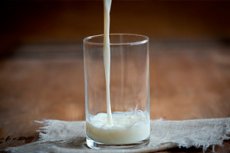Medical expert of the article
New publications
Milk for colds in child and adult
Last reviewed: 04.07.2025

All iLive content is medically reviewed or fact checked to ensure as much factual accuracy as possible.
We have strict sourcing guidelines and only link to reputable media sites, academic research institutions and, whenever possible, medically peer reviewed studies. Note that the numbers in parentheses ([1], [2], etc.) are clickable links to these studies.
If you feel that any of our content is inaccurate, out-of-date, or otherwise questionable, please select it and press Ctrl + Enter.

Among the many folk remedies that have long been used to treat respiratory diseases, one of the first places is occupied by milk for colds, used to relieve coughs and sore throats.
Can everyone drink milk when they have a cold?
Despite all the talk about the inability of adults to digest milk proteins, the benefits of milk are practically beyond doubt, since it contains:
- proteins (casein, lactalbumin, alpha and beta globulins);
- fats in the form of mono-, di- and triglycerides, as well as lecithin;
- polyunsaturated fatty acids;
- carbohydrates in the form of lactose (milk sugar);
- essential amino acids (lysine, leucine, valine, methionine, threonine, tryptophan, etc.);
- fat-soluble vitamins (A, D, E, K);
- water-soluble B vitamins (thiamine, riboflavin, niacin, biotin, cobalamin, pantothenic and nicotinic acids);
- microelements (calcium, magnesium, phosphorus, potassium, selenium and zinc) in the form of salts associated with casein micelles.
Milk also contains enzymes, but most of them are inactivated during pasteurization, which increases its shelf life. However, among heat-resistant milk enzymes, experts name lactoferrin and lactoperoxidase, which have some bactericidal (antibacterial) properties.
 [ 1 ]
[ 1 ]
Recipes with milk for colds
We remind you that you should only drink pasteurized or boiled milk when you have a cold. It is not recommended to drink hot milk (t>60°) when you have a cough: the phlegm may become thicker, which will make it difficult to cough it up. Therefore, you should only drink warm milk when you have a cold with a cough and a sore throat - with a temperature of no higher than +45°C.
Most often, milk with honey is drunk for colds: a teaspoon of honey is put into 150-200 ml of heated milk, which dissolves during the stirring process. You need to drink in small sips while the milk is warm. Honey with milk is also recommended for pregnant women for colds, for more details see - Milk for cough during pregnancy
And milk with butter for colds and bronchitis eases dry cough: a little butter is added to similarly heated milk, which can be replaced with the same amount of cocoa butter. Milk with butter and honey will bring double benefit.
An equally popular recipe is soda with milk for colds, or rather, milk with soda: half a teaspoon per glass. Due to its alkalinity, this composition works no worse than pharmacy mucolytic (phlegm-thinning) agents. Soda can be replaced with alkaline mineral water in a 1:1 ratio. Both versions of this recipe should not be used with low stomach acidity (pH> 7), and possible complications in this case will manifest themselves in digestive problems and a feeling of discomfort in the epigastric region.
An old recipe suggests milk with onions for colds: chopped onions (two or three onions) should be boiled in milk (0.5 l) until the onions become soft; strain the brew and when it cools to +45°C add a tablespoon of honey. It is recommended to take this remedy every hour, one or two tablespoons.
Another option is milk with garlic for colds: the same as milk with onions, only when boiling it, add another 3-5 cloves of garlic. A modernized and, from the point of view of preserving phytoncides, more therapeutically effective version consists of adding onion and/or garlic juice to warm milk (a teaspoon per half a glass).
Adults are advised to take milk with propolis for colds, redness and sore throat: for 150 ml of milk - a teaspoon of 10-20% alcohol tincture of propolis (take twice a day).
Positive reviews about the use of ginger for coughs also apply to such a recipe as milk with ginger for colds. It is prepared and taken in the same way as milk with onions.
A remedy for bronchitis is also prepared, consisting of a mixture of aloe juice (tablespoon), lard (tablespoon) and the same amount of butter and honey. The resulting mixture (teaspoon) should be put into warm milk (180-200 ml) and drunk twice a day (the second time - before bed).
A good remedy for any cough and cold, popular in Indochina, is warm milk with turmeric (one teaspoon per glass); take twice a day.
Here is a recipe from Bulgarian folk healers for coughs and colds: boil four walnuts in their shells and a tablespoon of dried black elderberry flowers in two glasses of milk; add a couple of teaspoons of honey to the slightly cooled mixture. Drink several sips three to four times a day.
Can you drink milk if you have a cold?
Yes, but not for everyone. The main contraindications for milk consumption by adults and children include:
- allergy to cow's milk;
- lactose allergy;
- asthmatic bronchitis;
- digestive disorders accompanied by diarrhea;
- chronic diseases of the pancreas and intestines.
Those who are allergic to cow's milk can use goat's milk for colds.
 [ 2 ]
[ 2 ]

